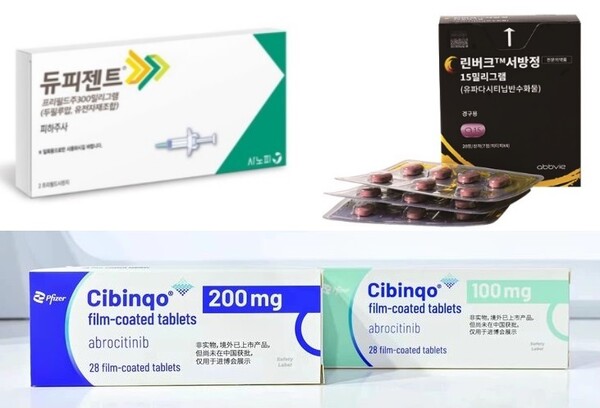As the government moves toward expanding insurance coverage for atopic dermatitis from adult to children and adolescent patients, negotiation will likely speed up to give benefits to injections and pills.

For example, Sanofi is bargaining with the National Health Insurance Service (NHIS) to determine the price of Dupixent (dupilumab) after it won recognition for the drug’s efficacy for children and adolescents with skin trouble two weeks ago.
Dupixent, the only biological drug to treat atopic dermatitis, must newly register the 200mg injection used for children and teens aside from the 300mg injection already registered for reimbursement for adult patients.
Accordingly, the company and health authorities will also discuss lowering the drug price due to the increase in insured patients and the new registration of 200mg injection during the ongoing negotiation.
So far, children and adolescent patients have had to take prescriptions for 300mg injections without insurance benefits or 200mg injections at higher prices.
Considering that children and adolescents must take Dupixent once or twice a month as maintenance treatment, the patients and their guardians must shoulder 700,000 won to 1.4 million won ($568-$1,136) a month.
So, suppose the drug price negotiation proceeds without problems. In that case, the young patients will receive treatment at one-tenth of the current cost within the first half of this year, including special benefits which apply 0-10 percent of the rate to patients’ burdens, with the government picking up the rest.
Depending on the progress of Dupixent bargaining, some oral treatments, such as AbbVie’s Rinvoq (upadacitinib) and Pfizer’s Cibinqo (abrocitinib), will likely hurry to receive similar benefits.
Currently, the Health Insurance Review and Assessment Service (HIRA) does not recognize reimbursement for the interchanging use of injections and pills. Accordingly, it is difficult for patients to use Dupixent first and shift to oral treatments later.
Unlike the adult atopic dermatitis market dominated by Dupixent, children and adolescent markets are open for entrance simultaneously with Dupixent, depending on the strategy of oral treatment sellers.
HIRA is examining the possibility of reimbursing Rinvoq and Cibinqo to treat atopic dermatitis in adolescents 12 and older. Suppose the drugmakers lower their prices preemptively, considering the government’s financial burden. In that case, they can shorten the negotiation period with insurance authorities and enter the children and adolescent market simultaneously with Dupixent.
Rinvoq, which already receives insurance coverage for adult patients, costs only 600,000 won a month, less than half of Dupixent’s. So the government thinks the more the number of patients starting their treatment with Rinvoq, the less its financial burdens will become.
The same can be said about Cibinqo, which has never withdrawn its application for insurance benefits since it won approval, as the drug was newly registered for both adults and younger patients, it can enter the market immediately without price negotiations if Pfizer accepts the government-proposed price within the weighted average level.
According to market watchers and patient group representatives, the government can kill two birds with one stone, expanding excess for children and adolescent patients and saving drug bills.
“Adult atopic dermatitis patients have benefited from sharply lowered financial burdens due to insurance benefits. However, younger patients have had to endure enormous costs,” said Choi Jeong-hyun, a patient group representative. “Children and teenagers, who are keenly aware of appearances despite having to focus on study, badly need insurance benefits. So the recent development is good news for them.”
Noting that the patient group regards insurance benefits for younger patients as the most urgent issue, Choi said, “If the matter is solved this year, we will deliver our opinion to the government regarding the coverage of interchangeable administration over time.”
Related articles
- AbbVie’s Skyrizi expands insurance benefits for adult psoriatic arthritis
- Children with severe atopic dermatitis can save maximum $12,300 a year
- Sanofi’s Dupixent expands insurance coverage for children and adolescents in Korea
- Sanofi's Dupixent, AbbVie's Rinvoq to compete in Korea's pediatric atopic dermatitis market

